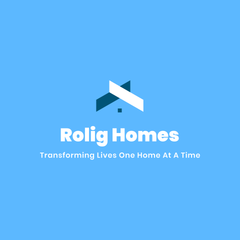Rolig Homes is a Community Benefit Society, registered under the Co-operative and Community Benefit Societies Act 2014. As such we are a not-for-profit entity. The purpose of a community benefit society is to serve the broader interests of the community, in contrast to co-operative societies that serve the interests of members.
The 2014 Act requires a community benefit society to “carry on a business, industry or trade” that is “being, or intended to be, conducted for the benefit of the community”.

" I'm passionate about the provision of suitable housing regardless of people's needs. Its a basic right, to have a house you can be proud to call home"
Nathan Stolborg - Chief Executive
Having founded Rolig Homes in 2024 to provide high quality, safe and sustainable homes, Nathan is responsible for providing leadership and strategic direction for our organisation. Nathan has worked in the housing and care and support sectors for the last 25 years and is passionate about ensuring that customers have the level of help that they want to enable them to thrive in their home.
Nathan has previously worked at executive level for a Registered Provider and managed the Tenancy and Community Support function for a large Housing Association based in Hampshire for several years. Nathan has significant experience of collaborating with Local Authority housing, commissioning and social care teams, developers, care and support providers, customers, and other stakeholders to ensure that housing projects meet the needs and wishes of the customer.
Matt Smith - Chief Operating Officer
Matt has over 25 years experience in the Social Housing sector and has worked for a number of large providers at a senior level. His background is in the development, management and delivery of tenancy sustainment and community investment services, centred around the customers needs. Matt is committed to the provision of safe, warm and affordable homes and has seen first hand the benefits of getting this right and also what can happen if providers get it wrong.
Matt has extensive experience working across different areas of social housing, including, property maintenance/repairs, lettings, complaints, IT as well as facilities management experience. His role with Rolig is to oversee the day to day operational aspects of the business, ensuring that homes are fit for purpose and customers receive a first class service.
Matt is also a qualified Life Coach and Mentor having qualified in 2022 and regularly coaches clients and staff to help them overcome obstacles and overcome whatever challenges they face.

"I want us to be known for quality homes and and a partner of choice for Local Authorities to want to work with. Everyone deserves a home to be proud of and that's my aim for all of our residents"
Our Team
We have a team of staff working across all sites and head office to ensure our tenants receive the best support they need.
Where we work
We work closely with Local Authorities and a wide range of local and national stakeholders to ensure our homes are safe and secure and our customers well supported.
Our Property Portfolio
- Head Office ST18 0AR, Stafford, Staffordshire, England, United Kingdom
- North Newton-le-Willows, Merseyside, England, United Kingdom
- North St. Helens, Merseyside, England, United Kingdom
- Midlands Stoke-on-Trent, England, United Kingdom
- West Midlands Wolverhampton, West Midlands, England, United Kingdom
- Midlands Leek, Staffordshire, England, United Kingdom
The need for Supported Housing -
a national context
Supported housing helps more than half a million people to live independently in their communities. It provides a vital service to the people in our society who need the most support, from survivors of domestic abuse to young people leaving care. Research commissioned by the National Housing Federation in 2024 (performed by Altair Ltd) showed a clear need for more supported housing, with demand significantly outstripping supply – a trend that is predicted to continue to at least 2040.
Without a long-term plan for housing, thousands of people could go without the support they need, costing the public purse and leaving people who could live independently with support facing long stays in residential or institutional care, or at risk of homelessness.
As of 2023, there are an estimated 509,873 supported homes owned by registered providers of social housing in England. Most supported housing is for older people. In 2023, for social landlords in England, 71% of homes were for older people.
How much supported housing will we need by 2040?
The findings show that demand for supported housing will grow significantly in the years ahead. With a rising and ageing population, we need to make sure everyone in our communities has a safe place to call home.
Looking at projections based on current supported housing homes and population rise, research shows:
- We will need 167,329 more homes by 2040. This is a 33% increase, from 509,873 in 2023 to 677,202 in 2040.
- Around 1/4 homes will need to be tailored for working aged adults and 3/4 for older people.
- Long-term supported and older people’s housing will be vital. We will need 20-22% of homes to be short-term and help people in crisis, and we will need 78-80% of homes to be long-term and provide a secure home for those who need it.
- A large ‘hidden need’ with those in need not getting support, such as older people who need help with daily living and numbers of people with substance misuse issues who are not in treatment - potentially 2.42million people in 2020-2021.
In reality, the demand may be much higher. The supply of supported housing has not kept pace with the increasing population of England, and we may be short of at least 50,000 homes. When we look at projected demand, as many as 1.7 million people may need supported housing in 2040.









